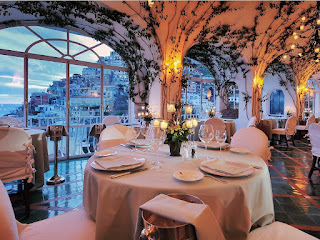What's the Role of Sustainability in Modern Restaurants?
In today's world, sustainability has become a crucial aspect of our daily lives. From reducing waste to conserving energy, individuals and businesses alike are recognising the importance of making environmentally conscious decisions. The food industry, in particular, plays a significant role in shaping our sustainable future. In this blog post, we will explore the role of sustainability in the best restaurant Napier, highlighting the various practices and strategies they can adopt to promote a greener and more environmentally friendly approach.
Embracing Locally Sourced Ingredients
One of the most effective ways for restaurants to contribute to sustainability is by embracing locally sourced ingredients. By using ingredients that are grown or produced within the local community, restaurants can significantly reduce their carbon footprint. Additionally, this practice supports local farmers and strengthens the local economy.
Restaurants that prioritise locally sourced ingredients can take pride in knowing that their food is of the highest quality. Fresh produce, meat, and dairy products that have not travelled long distances are often more flavourful and nutritious. By building relationships with local farmers and suppliers, restaurant Queenstown NZ can ensure that their ingredients are sustainably produced and meet their high standards.
Minimising Food Waste through Smart Practices
Food waste is a pressing issue in the restaurant industry. Modern restaurants can play a crucial role in minimising food waste through smart practices. One effective strategy is portion control. By offering appropriate portion sizes that satisfy customers without creating excess waste, restaurants can strike a balance between customer satisfaction and waste reduction.
Proper inventory management is another key element in reducing food waste. By accurately tracking inventory and avoiding over-purchasing ingredients, restaurants can minimise spoilage and ensure that all food is utilised efficiently.
Creativity in repurposing leftovers is yet another way for restaurants to combat food waste. Leftover ingredients can be transformed into new dishes or used in stocks and sauces, minimising waste while adding unique flavours to the menu. By sharing these innovative solutions with customers, restaurants can also inspire their diners to adopt similar practices at home.

Implementing Energy-Efficient Solutions
Energy efficiency is an integral part of sustainable restaurant operations. By implementing energy-efficient solutions, restaurants can reduce their environmental impact while saving on energy costs.
There are various methods that the best restaurant Napier can employ to reduce energy consumption. One approach is to invest in energy-efficient appliances. Energy Star-rated appliances, for example, consume less energy while providing the same level of performance. By incorporating these appliances into their kitchen operations, restaurants can make a significant difference in their energy usage.
Another aspect to consider is lighting. Switching to LED lighting not only reduces energy consumption but also offers a longer lifespan and lower maintenance costs. Additionally, LED lights produce less heat, which can be beneficial in a kitchen environment where temperature regulation is crucial.
Optimising HVAC systems is also an important step towards energy efficiency. By regularly maintaining and cleaning these systems, restaurants can ensure optimal performance and reduce energy waste. Additionally, installing programmable thermostats allows for precise temperature control, ensuring that energy is not wasted when the restaurant is closed or during less busy periods.
Restaurant owners can also make small changes to promote energy efficiency without compromising customer experience. These include turning off lights and equipment when not in use, using natural lighting whenever possible, and encouraging staff to be mindful of energy consumption.
Promoting Responsible Seafood Sourcing
The issue of responsible seafood sourcing is of utmost importance in the restaurant industry. Unsustainable fishing practices have had a devastating impact on marine ecosystems, leading to overfishing and the depletion of fish populations.
Educating consumers is another vital step towards promoting sustainable seafood choices. By providing information about the origin of their seafood and the sustainable practices followed, restaurants can empower customers to make informed decisions. Menus can also highlight sustainable seafood options, encouraging patrons to make choices that align with their values.
Engaging Customers in Sustainable Dining Experiences
Engaging customers in sustainable dining experiences is a powerful way for restaurant Queenstown NZ to promote sustainability beyond their walls. By involving customers in their sustainability initiatives, restaurants can create a sense of community and inspire positive change.
One effective way to engage customers is by offering plant-based menu options. By introducing delicious and innovative vegetarian and vegan dishes, restaurants can cater to a growing demand for sustainable and ethical dining choices. This not only expands the range of options available to customers but also reduces the environmental impact associated with meat production.
Another way to engage customers is by providing information about the restaurant's sourcing practices. By sharing stories about local farmers and suppliers, restaurants can forge a deeper connection between customers and the food they consume. This transparency builds trust and encourages customers to support sustainable practices.
Organising workshops or cooking classes focused on sustainable cooking is yet another way to involve customers. By sharing tips and techniques for reducing waste, using seasonal ingredients, and adopting sustainable cooking methods, restaurants can empower their customers to make positive changes in their own kitchens.
Conclusion:
Sustainability is a crucial aspect of the best restaurant Napier and the food industry as a whole. By embracing locally sourced ingredients, minimising food waste, implementing energy-efficient solutions, promoting responsible seafood sourcing, and engaging customers in sustainable dining experiences, restaurants can play a significant role in creating a better future.
It is essential for both restaurant owners and customers to recognise the impact of their choices and take action towards a more sustainable future. Supporting sustainable restaurants, sharing experiences, and advocating for sustainable practices can collectively make a significant difference. Let us join hands in creating a greener, healthier, and more sustainable food industry for generations to come.

Comments
Post a Comment